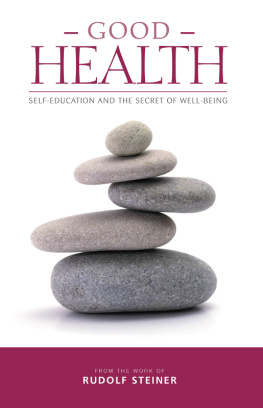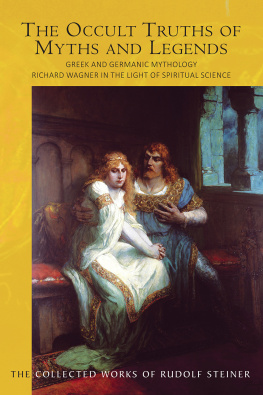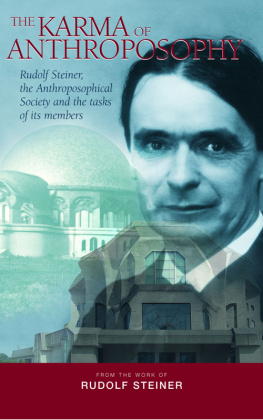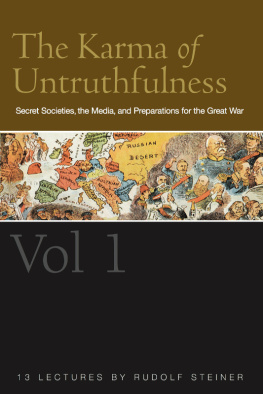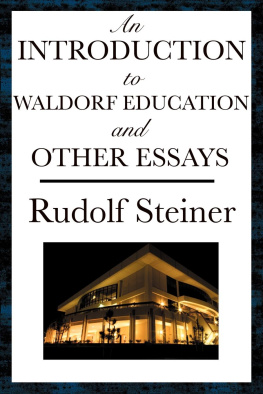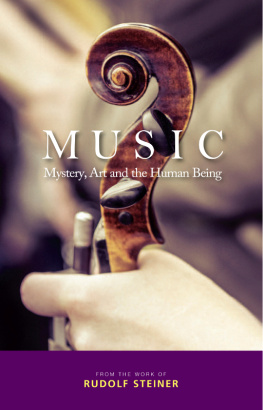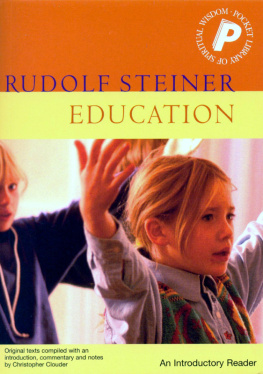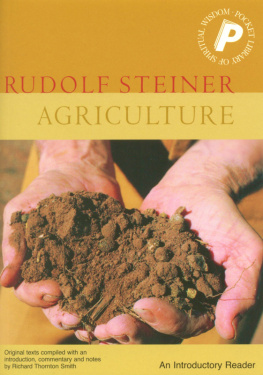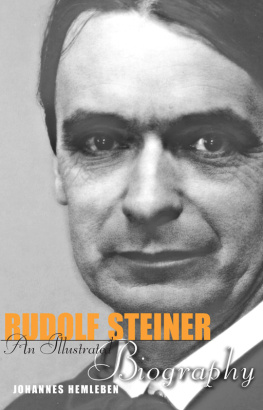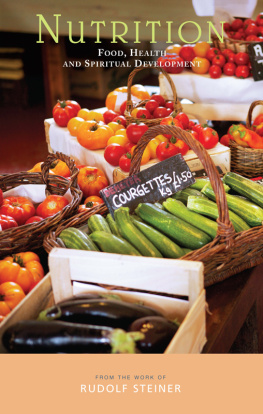
RUDOLF STEINER (18611925) called his spiritual philosophy anthroposophy, meaning wisdom of the human being. As a highly developed seer, he based his work on direct knowledge and perception of spiritual dimensions. He initiated a modern and universal science of spirit, accessible to anyone willing to exercise clear and unprejudiced thinking.
From his spiritual investigations Steiner provided suggestions for the renewal of many activities, including education (both general and special), agriculture, medicine, economics, architecture, science, philosophy, religion and the arts. Today there are thousands of schools, clinics, farms and other organizations involved in practical work based on his principles. His many published works feature his research into the spiritual nature of the human being, the evolution of the world and humanity, and methods of personal development. Steiner wrote some 30 books and delivered over 6000 lectures across Europe. In 1924 he founded the General Anthroposophical Society, which today has branches throughout the world.
GOOD HEALTH
SELF-EDUCATION AND THE SECRET OF WELL-BEING
RUDOLF STEINER
Compiled and introduced by Harald Haas
Translated by Matthew Barton
RUDOLF STEINER PRESS
Rudolf Steiner Press, Hillside House, The Square Forest Row, RH18 5ES
www.rudolfsteinerpress.com
Published by Rudolf Steiner Press 2017
Originally published in German under the title Sich selbst erziehen by Rudolf Steiner Verlag, Basel, in 2014
Rudolf Steiner Verlag 2014
This translation Rudolf Steiner Press 2017
All rights reserved. Apart from any fair dealing for the purpose of private study, research, criticism or review, as permitted under the Copyright, Designs and Patents Act, 1988, no part of this publication may be reproduced, stored in a retrieval system, or transmitted in any form or by any means, electronic, electrical, chemical, mechanical, optical, photocopying, recording or otherwise, without the prior written permission of the copyright owner. Inquiries should be addressed to the Publishers
A catalogue record for this book is available from the British Library
Print book ISBN: 978 1 85584 533 6
Ebook ISBN: 978 1 85584 492 6
Cover by Morgan Creative featuring image eplisterra
Typeset by DP Photosetting, Neath, West Glamorgan
Contents
Introduction:
The Basic Ideas Behind Salutogenesis
by Harald Haas
Forgetting
Berlin, 2 November 1908
Seminar Discussions on the Temperaments
Stuttgart, August 1919
Self-education
Berlin, 14 March 1912
Introduction
THE BASIC IDEAS BEHIND SALUTOGENESIS
In Rudolf Steiner's pedagogical lectures he tells us repeatedly that education and health have been seen as connected from time immemorial:
The idea was that when a person is born into earthly existence, he is really one level lower than truly human, and that he must first be drawn up, educated up, healed up to the human level. Education was seen as healing, was intrinsically part of medicine and healthcare.
One of the primary endeavours of Rudolf Steiner's pedagogy was to reconnect these two fields, in practical terms through the collaboration of teachers with the school doctor. It was important to him that:
... education can only be rightly practised if it is regarded as curative, if the teacher is aware that he must be a healer.
In ancient times, self-education was also called self-cultivation, (in the chapter entitled Self-Education and the Cultivation of Health) Marco Bischof gives a survey of this ancient outlook. He also traces how the same theme, originating in ancient and eastern wisdom, was taken up again by modern philosophers such as Michel Foucault, Gemot Bhme and Peter Sloterdijk.
In the works of Rudolf Steiner, too, we find countless comments about self-development, not only as it relates to acquiring faculties of supersensible cognition but also as a way of improving health and coping better with ordinary life.
The texts compiled in this volume aim to present some basic ideas on education and self-education in connection with health and illness, (salutogenesis or hygiogenesis, as it is now called, and pathogenesis). It is astonishing that the concept of salutogenesis, first formulated in the 70s of the last century by the American-Israeli medical sociologist Aaron Antonovsky, has so quickly become current in a range of medical fields. While it seems a new paradigm, closer scrutiny actually shows it to have many, much older antecedents.
Rudolf Steiner's account of the whole context of human health and illness still goes far beyond ordinary scientific views, since alongside physical aspects he also includes soul-spiritual ones that come to expression in questions of destiny and repeated lives on earth. Two lectures from 1908 and 1912 were chosen as fundamental statements on these themes, extended and enlarged by extracts from other works by Steiner.
The first lecture, Forgetting (in GA 107), was given to members of the Berlin branch of the Theosophical Society on 2 November 1908, and focuses primarily on memory as the basis of education and cultural development as well as its significance for health and illness. It also picks up on aspects of after-death existence and, at the end, characterizes the temperaments and their importance for health.
In the public lecture Steiner gave on 14 March 1912, Human Self-education in the light of Spiritual Science (in GA 61), Steiner presents self-education as a schooling of the will, and distinguishes it from the training of thought life. Elements that surface here are free play and gymnastics as well as empathy, conscience, and the cultivation of certain fundamental ideas through to the acceptance of destiny.
Below, by way of introduction, I will briefly outline and discuss the basic ideas contained in these lectures.
The lecture on Forgetting, which self-evidently considers both memory and the process of remembering, starts with our ordinary daily experiences of these. Memory is here shown to be located in the etheric body, while the astral body is seen as responsible for providing impressions and stimulus. Unlike the plant, part of the human being's etheric body is free, and it is here that education can exert an informing influence by developing soul-spiritual qualities. By contrast, what we bring with us as inherited characteristics is incorporated into our physical, etheric and soul corporeality as habits, passions and instincts. In other words, aspects of heredity and education interpenetrate in the various levels or bodies of our human nature. Only in the free part of the etheric body can new ideas enter us through education and contribute to our cultural development.
People certainly vary a great deal in their capacity to absorb and assimilate new ideas. Rudolf Steiner assumes that someone who is more flexible in this regard will find it easier to engage in processes of healing or, in modern terminology, will have better capacities of salutogenesis.
Steiner goes on to show that in our conscious life of thought, forgetting is a wholesome ability since, for example, being unable to forget anxieties and hurts or slights will in turn damage health. But in a more far-reaching stratum of the memory, all memories are retained. After death they are experienced as a memory tableau lasting several days, as is well known from accounts of near-death experiences. In the after-death period of kamaloka (Sanskrit = place of desires; or purgatory in Christian terminology) negative memories are distinguished from positive ones, and the latter, as the achievements and fruits of the life that is past, become the shapers and crafters (Rudolf Steiner) of our next life. Here our memories are no longer dependent on an individual etheric body, which has by now largely dissolved into the universal ether, but are instead available to our soul and spirit through all that is inscribed in the Akashic Records, as they are known, in which memory is retained of everything that happens in the world.
Next page
